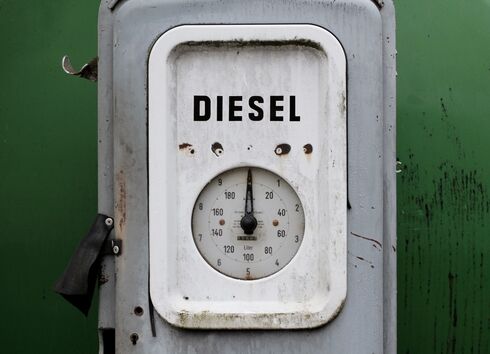
Changing from red to white
22 February 2022

For some time now, hire companies and end users have been trying to work out the business impact of the forthcoming changes in the status and use of red diesel and other rebated fuels used in construction.
From 1 April, when refuelling or topping up fuel tanks for construction related purposes, vehicles and machinery must only be filled with white diesel or duty-paid biodiesel fuels.
The rebated fuels affected by these changes are rebated (red) diesel, rebated HVO (hydro-treated vegetable oil, rebated biodiesel and bio-blend, and fuel substitutes. HVO is a liquid hydrocarbon which is classified for excise purposes as heavy oil and treated the same as diesel.
According to guidance from the Construction Plant-hire Association (CPA), HMRC accepts that vehicles will be using red diesel on construction sites in the weeks after 1 April; however, as tanks run low, companies and clients will be required to replace the used red diesel with white diesel, or duty-paid biodiesel.
HMRC is working on the basis that fuel colourisation within tanks and the fuel itself will gradually change as the tanks are re-filled.
The Treasury believes the tax increase will incentivise the adoption of green equipment, and says that manufacturers have less incentive to spend on R&D for eco-friendly machines when diesel is cheap. Green equivalents have to be cheaper to run than diesel equipment before there is a market for them, it says.
Organisations like the CPA and the SPOA (Scottish Plant Owners Association) have also highlighted the operational challenges faced by hirers and operators who will have to switch over to white fuel, and by those who can still also supply equipment with red diesel after 1 April for use by exempt groups such as farmers, if undertaking agricultural – but not construction – tasks.
I asked a few hirers for their opinions about the likely impact that the shift to white diesel might have for them and their customers.
“I think we might see a slowing of construction activity after April and some larger projects might be delayed,” said Tim Garland, managing director of Elvington Plant Hire near York, which serves a number of local farmers as well as construction firms and builders. Its clients also include golf courses, who can still legally use red diesel after April for non-construction tasks.
“Contractors might have quoted and budgeted for doing the work at a certain price some time ago and will have had to re-cost the contracts, leading to higher costs for the customer. Some projects might be postponed indefinitely.
“Effectively the cost of fuel is going to double. We’ve looked at alternatives like HVO and it’s the same price or more."
Tim says that Elvington is switching over to supply equipment solely with white diesel.
“We’re basically saying to our farm and golf course customers that when they off-hire a machine, it must not have red diesel in it. We can’t have a situation where we, or they, are draining machine tanks and flushing them through to remove red diesel traces.
“A farmer with a 13-tonne excavator could be draining around 300 litres of red diesel and then what do they do with it?”
The CPA recommends that at the start of a hire and when the machinery is returned, the hire company is able to provide evidence towards what type and how much fuel was in the machine when it went out, and to check what type and how much fuel is within the tank when it is returned. The association refers its members to Clause 28 in the CPA Model Conditions, which states the customer will be liable for damages or losses if the wrong fuel is added to the machinery.
“I heard that one civil servant suggested that a solution might be to run two fleets, one red and the other on white. Some of the big boys might be able to do that, but we can’t,” added Tim.
“It’s ill-thought through. There’s no real practical guidance. I understand why the Government is doing this but I can’t see it reducing emissions in the short term. It’s too much, too soon and about five years too early because battery powered alternatives aren’t available. Hydrogen is probably the way to go but it’s nowhere near ready yet.”
Tim also wondered to what extent the recent boom in construction activity has been fuelled (sorry!) by clients wanting to get work completed before the switchover to white diesel, in order to keep costs down.
“I also think some construction managers will be reluctant to store white diesel on site because of the theft risk. I am seeing adverts for a lot of fuel delivery companies starting up, offering daily services to fill machines up with a truck-mounted bowser.”
One hirer I spoke to has bought a larger 19,000-litre fuel tank to store white diesel at their main depot because bulk deliveries benefit from a price discount. I am not identifying this hirer because they realise that such an amount of fuel is a target for thieves. They are hiding it from view in a newly built – and expensive – compound, and the tank itself requires pin code authorisation for access.
Indeed, the CPA urges members to review their current security arrangements at depots, as well as for plant and machinery out on hire. This could include CCTV, fuel tank alarms, and restricting access through enhanced fencing.
Jim Longstaff, chairman of Coventry-based Clements Plant & Access Hire, said of the red diesel rebate removal, “It’s a poor decision, ill-thought through. They [the government] are grasping at straws to grab back tax.
“Battery technology has not developed sufficiently to provide replacements for heavier-duty plant requirements so as to provide a meaningful shift for a major contractor or jobbing builder. What good is a digger running out of juice halfway through the day and then needing eight hours to recharge?
“Furthermore, recharging will be a challenge if the project is on a green or brownfield site with no utilities or charging infrastructure. And hydrogen technology is years away.”
Because of this, Jim believes that users will need to keep filling up with diesel or an eco-friendlier alternative like HVO for some time yet, with the resultant cost increases after 1 April.
“What the authorities may also not have realised is that the price increase will affect the cost of materials. For example, quarries use large dozers, diggers and crushers that all run on red diesel at the moment, and use considerable quantities of it. When they shift to white diesel, costs must go up drastically for operators and, in turn, consumers.”
Another hirer with depots throughout the country agreed that costs and hire rates must go up to compensate for the fuel price increase, but that it is easier said than done.
“We’ve tried to raise our rates this year because suppliers are increasing their prices, in some cases by 30% or more, and now there’s the extra cost of white diesel to deal with,” they said. “We can’t even get a 5% increase when there are other hirers prepared to cut prices to win business. Yet some of the new green equipment is twice the price or more.
“And it’s not just the cost of white diesel. There are security issues as well. There’s going to be more theft and pilferage from machines and fuel tanks because thieves know the fuel used on construction sites can now be used directly in cars and other equipment with no traceability. Equipment might be damaged in the process, leading to insurance claims and premiums going up, too.”
David Chandler, managing director of Hire and Supplies in Dumfries, believes that many construction professionals are unaware of the imminent changes and that there should have been more government publicity about the issue to inform end users.
“I can’t understand why this isn’t being shouted from the rooftops,” he says. “We have worked out that there are more than 300 items of equipment in our fleet that will be affected. We are putting stickers on each one saying that if red diesel is put in the machine there will be a minimum £240 charge for cleaning the tank.”
However, looking further ahead, Luke George, managing director of Dorset & Somerset Hire Services, says that we could be seeing the start of “diesel’s last hurrah. The government’s removal of the red diesel rebate is basically saying to people that you have to do things differently, and that it will cost you too much not to.
“If you go to London right now, electric machines are being used more widely because they are zero emissions, zero noise. Even if it costs a bit more, blue chip contractors want to be seen to be doing the right thing. And as costs come down in future, it will become more affordable.
“In the meantime, hirers are going to have to charge for fuel upfront on each machine to cover our costs, so a £250 hire will become £450 anyway; an electric equivalent may require a rate of, say, £500, which is slightly more but with less hassle. The economics will eventually make it work.”
● To view a CPA/HMRC webinar from December 2021 on the red diesel rebate removal, giving an overview of the guidance and addressing some questions surrounding the transition process, click here.

